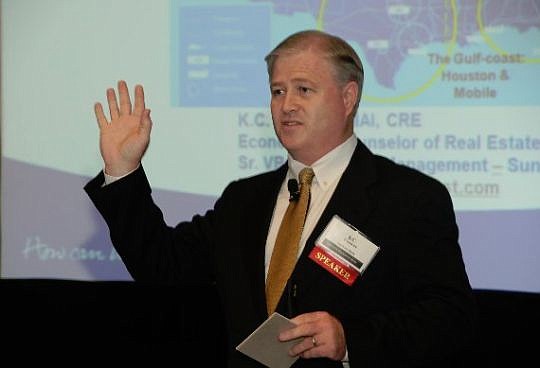
Don’t forget about the opportunities that would come with the Panama Canal expansion. Don’t fixate on them, either.
Rather, pay close attention to inland port development, technology and other expanding supply chain activities throughout the state and beyond — and then determine how Jacksonville can benefit.
That’s what a leading U.S. economist advised Jacksonville leaders eager to make way for increases in international shipping by deepening the St. Johns River channel.
“Don’t just think depth. Think land, sea and air,” Kiernan “K.C.” Conway, SunTrust Banks’ senior vice president for credit risk management, told NAIOP Northeast Florida members Tuesday.
Conway, of Atlanta, has 30 years of commercial real estate experience, including five within the Federal Reserve System. In 2007, he briefed then-Federal Reserve System Chairman Ben Bernanke on the impending real estate crisis.
Using the acronym MEAL, Conway said Jacksonville’s supply chain “meal ticket” revolves around Mexico, energy, automobiles and logistics.
“Jacksonville and JaxPort are doing all of those things,” he told the commercial real estate group during its monthly meeting at Jacksonville Marriott on Salisbury Road.
Conway said two recent announcements — Maersk adding service to Jacksonville and Volkswagen Group of America selecting Jacksonville as its Southeast hub — highlight JaxPort’s and Northeast Florida’s supply chain “relevance.”
“You have the largest shipping service in the world … and when you have an automobile manufacture like Volkswagen say, ‘This is where we want our cars,’ that’s a powerful statement,” he said.
Conway noted Jacksonville is benefiting from Mexico’s burgeoning role in automobile manufacturing. The country south of the U.S. border is exporting more than 3.5 million cars and trucks a year, a number that is expected to grow to 4.7 million by 2020, Conway said.
Many of those automobiles, including Volkswagens, are coming to Jacksonville.
“Your port folks are hitting a home run,” Conway said.
Conway also noted that by embracing liquefied natural gas, Jacksonville is ahead of other regions in the energy market. Northeast Florida is poised to be a key fuel stop for container ships, he said.
“If you’re the gas station, you will be a key link,” he said.
While Conway’s presentation was largely congratulatory, it was a pep talk, too. He said it’s critical that NAIOP and community leaders follow their Georgia peers’ lead by educating state legislators on the supply chain’s critical role in the local and state economy.
It is imperative the state not only in invest heavily in traditional and inland ports, but in roads and bridges, he said.
“Georgia is thinking about how it connects with Tennessee, South Carolina and Florida, and is building an export-important highway,” Conway in an interview said after his presentation. “Knowing what your competitors are doing is critical; Florida must start thinking, for example, about the road trips that might be needed between Jacksonville and Florida’s inland ports.”
NAIOP President Peter Anderson agreed.
“Certainly, the investment in Jacksonville should be shared by the state of Florida,” said Anderson, Pattillo Industrial’s development vice president. “There is work to be done there.”
Conway says Winter Haven’s new inland port, which supports freight transportation needs of customers throughout the state, will be a “game-changer” – and that Jacksonville can prosper from it.
Located outside crowded port areas, where land is scarce or not available at all, inland ports help connect the various transportation modes.
“Finding more efficient ways to move freight is critical for serving the Southeast, which is the fastest-growing region in the country …” he said. “If you are not in proximity to intermodal or have connectivity to it, you are irrelevant.”
Conway is a father of three adopted special-needs children. Anderson said that to honor Conway, NAIOP Northeast Florida is donating $1,000 in his name to Wolfson Children’s Hospital.